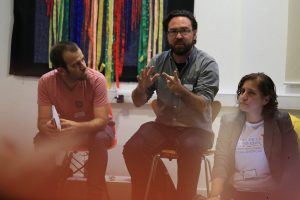Faces of Open Government: Juan Manuel Casanueva
Rostros de Gobierno Abierto: Juan Manuel Casanueva
In 2017, civil society and media organizations revealed that the Mexican government had spent US$80 million over 18 months on spyware to surveil lawyers, journalists, and human rightsAn essential part of open government includes protecting the sacred freedoms and rights of all citizens, including the most vulnerable groups, and holding those who violate human rights accountable. T... defenders. The scandal provoked public outcry and a temporary rupture of the open government process in the country. Juan Manuel Casanueva sat down with OGP to discuss a commitmentOGP commitments are promises for reform co-created by governments and civil society and submitted as part of an action plan. Commitments typically include a description of the problem, concrete action... in Mexico’s action planAction plans are at the core of a government’s participation in OGP. They are the product of a co-creation process in which government and civil society jointly develop commitments to open governmen... that seeks to address the lack of regulationGovernment reformers are developing regulations that enshrine values of transparency, participation, and accountability in government practices. Technical specifications: Act of creating or reforming ... and supervision of government digital surveillance.
Mexico’s action plan included some interesting commitments, covering issues such as gun control, genderOGP participating governments are bringing gender perspectives to popular policy areas, ensuring diversity in participatory processes, and specifically targeting gender gaps in policies to address gov... More, and beneficial ownershipDisclosing beneficial owners — those who ultimately control or profit from a business — is essential for combating corruption, stemming illicit financial flows, and fighting tax evasion. Technical... More. But the surveillance commitment is particularly interesting, as the role of a safe civic space and regulation of digital tools is gaining attention among the open government community. How did you come to include this commitment in the action plan?
Mexico’s fourth action plan commitments are tied to the surveillance case known as the “Spying government” of 2017. Civil society groups, supported by international journalists and an investigation by the New York Times, brought to light the fact that the Mexican Government was using spying software Pegasus against human rights defenders, journalists, and civil society groups. Accusations were presented before the General Attorney but, at that time, did not result in a judiciaryWhile a majority of open government reforms occur within the executive branch, OGP members are increasingly taking on commitments to increase the openness of the judicial branch. Technical specificati... process with credible results.
In light of the lack of responsiveness from the previous government to such accusations and its failure to take a stand against surveillance, in addition to the statements by the previous governments against those of us who were raising our voices and uncovering its government’s spying actions, civil society decided to withdraw from the open government process and terminate the action plan.
This scandal led to civil society taking steps to establish controls to prevent the government from abusing digital tools to spy on civilians, working to secure a safe, open and free civic space.
Civil society groups called for OGP’s to trigger its Response PolicyThe Response Policy is used when an OGP participating country appears to be taking actions that undermine the values and principles of OGP, as articulated in the Open Government Declaration, in a way ... unto the Government of Mexico, requesting OGP to intervene in Mexico’s actions to close the country’s civic space. This opened up the possibility to resume the open government process in a potential fourth action plan, co-created with the upcoming administration.
This return and reestablishment of the open government agenda were underpinned by the need to address the unregulated use of surveillance tools and to establish democratic controls to prevent the interception of private communications in Mexico.
This set the tone and the enabling conditions for civil society to work with the new government to establish the agenda and ensure that the new plan incorporated ambitious and concrete commitments.

There is clearly a long way to go, but what do you expect from this commitment? And how can we make sure that the action plan’s commitments stand after the end of its implementation cycle?
Our expectations of the surveillance commitment, but also of our collaboration with the new government are twofold:
First, we expect open government to be a real and integrated component of this government’s efforts to implement the action plan’s commitments, allowing for the establishment of mechanisms for openness and concrete outcomes.
Second, the surveillance commitment addresses a basic need that has been shown in Mexico, but that also applies to many other countries, where by law and in practice, public agencies can obtain – with much control or internal or external regulation – technology to surveil people without control, transparencyAccording to OGP’s Articles of Governance, transparency occurs when “government-held information (including on activities and decisions) is open, comprehensive, timely, freely available to the pub... More or accountability. There are different types of tools, from Pegasus and other extremely invasive software that can take over cell phones to intercepting traditional communication means such as phone calls, text messages, and others.
We expect to be able to work across the public federal administration and to set controls for the transparent and legal contracting of this kind of technology and ensure that it is solely for the government entities that require them to fight terrorism, organized crime and others. We also expect to establish controls and safeguards to prevent abuses against individuals who are not subject to criminal investigations.

In your opinion, did this experience spark interest from the international community to support or learn from Mexico’s experience? In what ways? How can OGP support his process?
The world is completely digital, not just in Mexico but globally. In this context, our privacy and basic rights – like our freedom of expressionJournalists and activists are critical intermediaries connecting public officials with citizens and serving as government watchdogs, and their rights and safety need to be protected. Technical specifi... More – are affected. We must thus guarantee our digital rights in the spaces where we operate. OGP should encourage governments to set in place policies and actions to respect digital rights in an effort to secure an open and safe civic space. Similar commitments should be incorporated in countries that lack solid democratic controls for the acquisition and use of surveillance technology.
We arrive at the same crossroads: How can we achieve government openness if the civic space is imperiled as we are seeing with selective surveillance and growing State capacity?
This is the intention of Mexico, but addressing the interception of private communications should be relevant in other countries’ open government process.
Today, civic space does not only mean the right to protest or to free press and safe journalism, but also to secure civil society’s private and safe acting.
Thus, one of the basic principles of open government was unfortunately breached by the spying activities of a Mexican administration. We highly suspect that other OGP member countries are also victims of this. OGP should be the platform to ensure that civic space remains open, safe and participatory in digital contexts where OGP works.
En 2017, organizaciones de la sociedad civil y medios revelaron que el Gobierno de México había gastado 80 millones de dólares en 18 meses en software para espiar a abogados, periodistas y defensores de derechos humanos. El escándalo la indignación del público y un quiebre temporal del proceso de gobierno abierto en el país. Juan Manuel Casanueva conversó con OGP sobre el compromiso del plan de acción de México que busca atender la falta de regulación y supervisión a los mecanismos digitales de vigilancia del gobierno.
México presentó un plan de acción con compromisos interesantes, desde el control de armas, género, hasta beneficiarios reales. Pero el compromiso sobre vigilancia es particularmente interesante en la manera que la importancia de un espacio cívico seguro y la regulación de herramientas digitales incrementa en la comunidad de gobierno abierto. ¿Cómo llegaron a la creación de este compromiso en el plan de acción?
El antecedente de los compromisos del cuarto plan de acción mexicano están ligados a el suceso de espionaje conocido como “Gobierno Espía” en el 2017. Grupos de sociedad civil, con eco de periodistas e investigación internacional del New York Times, revelaron que el gobierno mexicano estaba utilizando el software de espionaje Pegasus en contra defensores de derechos humanos, periodistas y grupos de sociedad civil. Los casos documentados fueron objeto de varias denuncias ante la Procuraduría General de la República en ese entonces pero no llevaron a ningún tipo de proceso judicial que diera una investigación veraz y creíble.
Ante la respuesta negativa del gobierno pasado para dar alguna explicación o posicionarse en contra de la acción de vigilancia, además de las declaraciones que llegó a hacer el anterior presidente de la República en contra de aquellos quienes estábamos levantando la voz y visibilizando las acciones de espionaje de su gobierno, el grupo de sociedad civil tomó la decisión de retirarse de la agenda de gobierno abierto y de la finalización del tercer plan de acción.
Ese escándalo llevó a que desde sociedad civil tomáramos medidas para establecer controles para que no hubiera abusos de las tecnologías digitales para la vigilancia estatal en contra de civiles y así poder trabajar para garantizar un espacio cívico seguro, abierto y libre.
Grupos de sociedad civil levantaron una política de respuesta ante el gobierno mexicano para que OGP interviniera ante las acciones de México en materia de cierre de espacio cívico. Con esto, planteamos la posibilidad de retomar los procesos de gobierno abierto en un potencial cuarto plan de acción con una nueva administración de gobierno.
Pero ese regreso y restablecimiento de la agenda de gobierno abierto tuvo como eje medular abordar el problema del uso indiscriminado de tecnologías de vigilancia y establecer controles democráticos para atender y prevenir intervención de comunicación privadas en México.
Eso fue lo que estableció un ambiente de colaboración propicio para que nos pudiéramos sentar en la mesa desde sociedad civil con el nuevo gobierno y establecer la agenda y que se viera reflejada con compromisos ambiciosos y puntuales en el nuevo plan de acción.

Claramente todavía hay mucho por hacer pero ¿cuáles son tus expectativas de este compromiso? Y ¿cómo podemos asegurarnos que los resultados de este sean vigentes más allá de este plan de acción?
Las expectativas que tenemos sobre el compromiso de vigilancia pero también unido al proceso del cuarto plan de acción con la actual administración del gobierno mexicano va en dos vías:
Primero, hay una expectativa donde el gobierno abierto sea una parte real e intrínseca del mismo gobierno en el abordaje e implementación de los compromisos del plan de acción y que realmente se puedan establecer estructuras y acciones que logren apertura y resultados concretos.
Segundo, el compromiso de vigilancia atiende una necesidad básica que ya está demostrada en el contexto mexicano pero que también aplica a muchos países del mundo en donde se sabe que a nivel normativo y de práctica, las instituciones públicas llegan a adquirir sin mayor control o regulación interna o externa, tecnología que sirve para la vigilancia de las personas sin controles, transparencia o rendición de cuentas ante posibles abusos en su privacidad. Estamos hablando de diferentes tecnologías, desde Pegasus y software de espionaje extremadamente invasivo que llega a tomar control total de un dispositivo móvil, hasta intervención de telecomunicaciones tradicionales como llamadas telefónicas fijas o celular, sms, y otros.
Nuestra expectativa es que se pueda trabajar a lo amplio de la administración pública federal y que se puedan establecer controles para la adquisición transparente y legal de este tipo de tecnologías solamente para las áreas de gobierno que realmente lo requieran, orientado al combate del terrorismo, a la delicuencia organizada y otro tipo de crímenes. Y que también se puedan establecer controles y salvaguardas para evitar abusos de esa tecnología en contra de personas físicas que no son sujetos de una investigación criminal.
¿Crees que esta experiencia generó interés de la comunidad internacional para apoyar o aprender sobre la experiencia de México? ¿De qué manera y cómo crees que OGP puede ayudar con esto?
Vivimos en un contexto completamente digital, no solo en México sino en el mundo, y es una realidad en donde nuestra privacidad y nuestros derechos más básicos como el de libertad de expresión se ven afectados. Es importante entonces garantizar los derechos digitales en los espacios en los que convivimos. Es importante que desde OGP inste a los gobiernos que fomentan la apertura cuenten con políticas y acciones que respeten los derechos digitales con tal de garantizar un espacio cívico abierto y seguro. Compromisos similares al de México deberían ser promovidos entre países de OGP que no tengan controles democráticos sólidos para la compra y uso de actuales tecnologías para la vigilancia.
Y llegamos a la misma encrucijada: ¿cómo podemos llegar a una práctica de apertura gubernamental si es que el espacio cívico tiene una vulneración de privacidad importante como lo estamos viendo en los casos de vigilancia selectiva y con capacidades muy avanzadas por parte de los estados?
Eso es lo que se busca en el caso mexicano, pero debería ser relevante para cualquier otro país atender el compromiso de gobierno abierto relacionado a la intervención de comunicaciones privadas en el contexto de gobierno abierto.
Hoy en día, el espacio cívico no solo se ve reflejado en la posibilidad de poder salir a la calle a protestar o tener una prensa libre y que pueda ejercer el periodismo de manera segura sino que también se puedan garantizar las acciones de sociedad civil de manera privada y de manera segura.
Es allí como uno de los principios más básicos del gobierno abierto fue lamentablemente vulnerado por las acciones de espionaje de una administración mexicana y tenemos la gran sospecha que otros países dentro de OGP están viviendo esta situación. OGP debería ser el espacio donde ese tipo de temas en materia de un espacio cívico abierto, seguro, participativo, pueda seguir siendo así en los contextos digitales que se viven todos los días y en los que la sociedad civil en OGP está participando todo el tiempo.
No comments yet
Related Content

Civic Space
OGP members are working to uphold basic freedoms of expression, assembly, and association even as these human rights are under global attack.

A Guide to Open Government and the Coronavirus: Civic Space
Governments are taking exceptional steps in response to COVID-19, such as enforcing social distancing and quarantine measures. Prohibitions against in-person gatherings have had a dramatic impact on civic space across…

Digital Governance in OGP
OGP countries are leveraging the opportunities of evolving technology, such as artificial intelligence, data-driven algorithms, and mass social networks, while also developing policies to deal with the threats, including disinformation,…


Leave a Reply